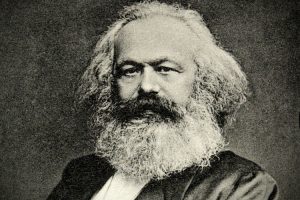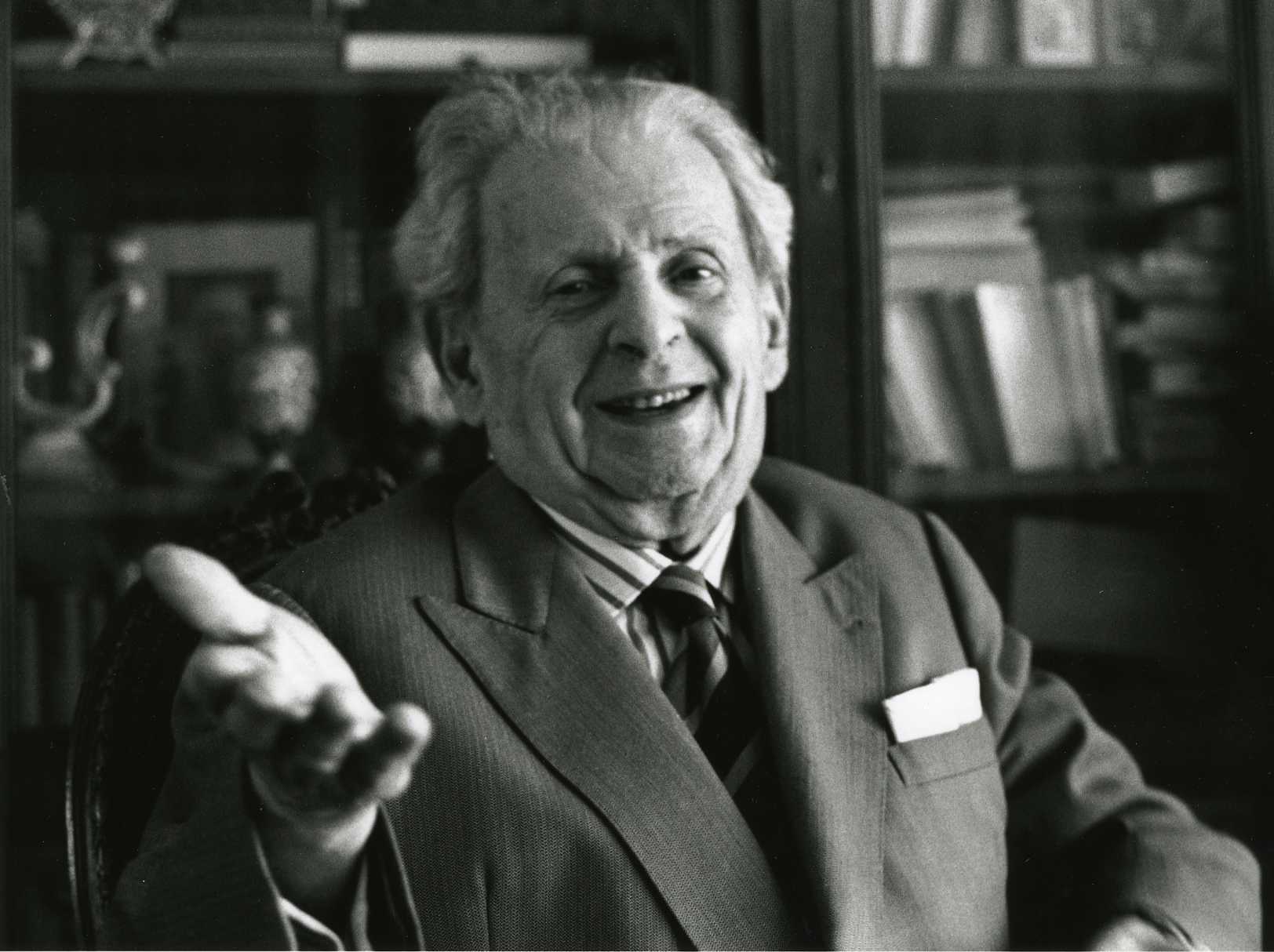“Benjamin’s Concept of History As A Source of Arendt’s Idea of Judgment” by Ronald Beiner is published in two parts during successive weeks. The following is the first portion.
“ich kehrte gern zurück.”– Gershom Scholem
That there is an intimate bond between the last thoughts of Walter Benjamin and the last thoughts of his friend Hannah Arendt is not just a matter of commentary or intellectual speculation.
One can trace this relationship quite tangibly in the very mode of transmission by which Benjamin’s “Theses on the Philosophy of History” were saved from the wreckage of Nazi-occupied Europe. Arendt scholars who consult the collection of Hannah Arendt papers housed in the Library of Congress (or view this collection online) have access to a series of postal aerograms on which Benjamin transcribed a version of the text in his unique miniature script, which he then mailed to himself at his Paris address from Basle and Marseilles.
The “Theses” was Benjamin’s final text, and it was apparently put in the care of Arendt and her husband, Heinrich Blücher, along with a suitcase of other manuscripts, in Marseilles the last time that Arendt and Blücher saw Benjamin. Arendt eventually passed the manuscript on to Adorno in New York, thus securing publication in several different places – in the mimeographed memorial volume produced by the Frankfurt School’s Institute for Social Research in 1942, in a French version (translated by Benjamin himself) in 1947, in a German periodical in 1950, and in Arendt’s own collection of Benjamin’s writings in 1968.1
Elisabeth Young-Bruehl’s Hannah Arendt: For Love of the World tells the story of how the “Theses” were borne, like a precious relic, from Lisbon to New York.2 Young-Bruehl recounts how the “Theses” were read aloud among a group of refugees in Lisbon while awaiting the ship that would carry them away from Nazi-overrun Europe.3 Accordingly, the “Theses” are worthy of reflection, not only as a literary text but also as a historical document.
Jürgen Habermas has described the “Theses” as “one of the most moving testimonies of the Jewish spirit.”4 Perhaps the “Theses” succeed in capturing this spirit because they were, almost literally, produced in flight. The “Theses” were written in early 1940, after Benjamin had been released from an internment camp in France. Only several months later Benjamin would be on the run from the Gestapo, as the Nazis occupied France.
Benjamin failed to make his escape. His flight from Europe was blocked at the Franco-Spanish border, where he took his life rather than risk the possibility of being handed over to the Gestapo. The story of his suicide, as related by Arendt and Gershom Scholem, is unspeakably tragic. When Benjamin wrote his “Theses,” the problem of how and by what means to flee from a Europe being swept by the Nazis was all-consuming. The Hitler-Stalin pact was still in force. Benjamin’s fate was not unlike that of the angel of history evoked in thesis IX, chased by the storm of progress away from a time piled high with catastrophe.
What is Walter Benjamin’s intention in his enigmatic “Theses on the Philosophy of History”? According to Benjamin’s friend Gershom Scholem, the “Theses” was Benjamin’s way of accomplishing “his awakening from the shock” of the Hitler-Stalin pact.5 According to Scholem, the “Theses” mark Benjamin’s decisive break with historical materialism and a return to the metaphysical-theological concerns of his early thought. What the “Theses” have left in common with historical materialism is “only the ironic relation of the termini technici”6; “frequently nothing remains of historical materialism except the term itself.”7

The secret core of the theses is in fact, for Scholem, the hope of a leap into transcendence.8 In support of his interpretation, Scholem cites the first thesis, where Benjamin proposes an alliance between historical materialism and theology. Historical materialism must take its guidance from theology if it is to win the day. History is likened to a chess game, where historical materialism appears to be in command, whereas in fact it is a mere puppet controlled by the unseen hand of theology.9
On Scholem’s reading of the theses, the angel of history (in thesis IX) cannot make whole again the fragments of history, and therefore Benjamin must have resort, in the last thesis, to the Messiah, who alone can succeed where the angel must fail – namely, in the redemption of history.10 On this reading, Benjamin appears as a theologian manqué fighting to break out of materialistic categories who finally forsakes the angel of historical materialism for the Messiah of Jewish theology.
The “Theses” themselves present a very different face. In every one of the theses, Benjamin gives the impression of struggling to define the true nature of historical materialism as well as struggling to formulate his position in relation to historicism generally. Phrases such as “the historical materialist knows this,” “historical materialists must be aware of that,” run throughout the “Theses.” In each of the theses, Benjamin seems to be defining the stance of the self-conscious historical materialist, as opposed to the false historicism of those who lack a genuine historical consciousness. Benjamin gives the appearance, at least, of someone concerned not to detach himself from materialist categories, nor to repudiate them, but to redefine those categories and to clarify the nature of his allegiance to them.
Historical materialism had always defined itself in terms of revolutionary expectations for the future. Accordingly, the historical past had always been analyzed in terms of what is to be. Benjamin strictly reverses this perspective. Historical materialism is now to be defined by a certain relation to the past, namely a redemptive relation.
Historical materialists are aware that each generation, including the present, is “endowed with a weak Messianic power” (thesis II). The task entrusted to historical materialism is not to make the future but to save the past. Historical materialism is a way of comporting oneself, not toward the totality of the historical process, but toward certain instants of the historical past: to make the fragments whole again. To be guardian over these moments is the task of the theological-materialist historian.
This conducts us to a second way in which Benjamin redefines historical materialism. One normally associates historical materialism with the idea of history as a rational process, as a dialectical movement, ordered by a purpose. Historical materialism, under the influence of Hegel, is an effort to conceive history as rationally intelligible. But there is nothing of this conception in Benjamin’s “Theses.” For Benjamin, history is radically fragmented; the task of the angel of history is to establish a redemptive relation to the fragments (thesis IX).11 This conception is certainly far removed from the idea of history as a rationally intelligible process.
But if Benjamin rejects the idea of history as a rational process, by what right does he claim to be speaking as a historical materialist and speaking for historical materialists? Is not Scholem then justified in saying that the “Theses” have nothing in common with historical materialism but the term itself, and that Benjamin uses materialist categories as a cover for reflections that are in fact metaphysical and theological?
I wish to suggest an answer to this question. In his “Theses,” Benjamin seeks to define, for the first time, the notion of a historical materialist historiography. The angel of history described in thesis IX has his face “turned toward the past.”12 That is the direction in which his gaze is pointed, and that is where the angel wants to linger. He would indeed dwell there, if he were not propelled away from the catastrophic past by a historical progression that is really mere frenzy.
The angel of history prefers to tarry at the ruins of the past in order to “awaken the dead,” to make whole what has been shattered. To this corresponds the redemptive function of historical reflection, the saving power of remembrance. The historian desires to keep faith with the past, and it is in this that his or her revolutionary commitment is expressed. Benjamin seeks to explain how one can be both a historian and a historical materialist, without defining or justifying the activity of historiography in terms of the immediate needs of revolutionary action. I believe that this had never been done before, strange as it may seem, and that in this way Benjamin defined a new scope for the historical materialist tradition.
Consider Marx’s historical writings on political events in nineteenth-century France – The Eighteenth Brumaire of Louis Bonaparte, The Civil War in France, and The Class Struggles in France 1848-1850. It is natural to regard Marx, in these writings, as a political analyst and revolutionary strategist, exerting himself to decipher the contemporary events of his time so as to plan revolutionary praxis on the basis of a better and more informed understanding of what promotes and what blocks effective action.
But here one does not view Marx specifically as a historiographer. What is missing from the conventional understanding of these writings is the distinctive relationship of Marx to the workers and revolutionaries whose tragedy he shares and whose failure he relates. Thus Benjamin serves to disclose a further dimension to Marx’s work as a historian, understood as an activity distinct from that of the revolutionary strategist, analyst, and so forth. He helps us see what Marx is really (implicitly) doing in these historical writings, even though Marx himself might be quite unaware of this dimension.
Marx begins the Class Struggles in France as follows: “With the exception of only a few chapters, every more important part of the annals of the revolution from 1848 to 1849 carries the heading: Defeat of the Revolution!” But Marx then proceeds to draw progress from defeat: The progress of the revolution required the creation of a powerful, united counter-revolution that would provide the opponent necessary for the ripening of a genuinely revolutionary party. So the revolutionary actors are defeated, but the revolution is carried forward.
more important part of the annals of the revolution from 1848 to 1849 carries the heading: Defeat of the Revolution!” But Marx then proceeds to draw progress from defeat: The progress of the revolution required the creation of a powerful, united counter-revolution that would provide the opponent necessary for the ripening of a genuinely revolutionary party. So the revolutionary actors are defeated, but the revolution is carried forward.
According to Benjamin’s seventh thesis, however, one would have to regard Marx as here turning against his own true intention as a historian, and as breaking faith with the actors who are the real concern of Marx’s narrative. To forsake the standpoint of the vanquished, as Marx appears to do here, is to betray the principles of a genuine historical materialist historiography. This is brought out well in Adorno’s commentary on thesis VII:
If Benjamin said that history had hitherto been written from the standpoint of the victor, and needed to be written from that of the vanquished, we might add that knowledge must indeed present the fatally rectilinear succession of victory and defeat, but should also address itself to those things which were not embraced by this dynamic, which fell by the wayside – what might be called the waste products and blind spots that have escaped the dialectic. It is in the nature of the defeated to appear, in their impotence, irrelevant, eccentric, derisory.13
This captures what Marx in his historical writings accomplishes implicitly (that is, insofar as he is writing as a historiographer), regardless of how far it may deviate from Marx’s own self-understanding as reflected in his explicit statements about what he is doing.
Several commentators on Benjamin cite Marx in the Eighteenth Brumaire: “The social revolution of the nineteenth century cannot draw its poetry from the past, but only from the future…. Earlier revolutions required recollections of past world history in order to drug themselves concerning their own content. In order to arrive at its own content the revolution of the nineteenth century must let the dead bury their dead.”14
This passage makes clear what is common to the conceptions of history of Benjamin and Marx as well as what makes them diverge sharply. It is true that for Benjamin, as for Marx, the revolution cannot draw its poetry from the past in the sense that it does not derive its content from previous history. On the other hand, according to our reading of the “Theses,” to say (as Marx does) that the dead must simply be left to bury their dead would be to relinquish precisely that which is the revolutionary moment in historical reflection. In this respect, Benjamin must repudiate the idea that the revolution may draw its poetry not from the past but from the future.
What hope there is comes not from the future but from a vanquished past that resists domination by the victorious enemy. Therefore it is the duty of the historian to continue “fanning the spark of hope in the past” (thesis VI).
What, then, distinguishes historical materialist historiography? Benjamin discusses this in many of the theses, above all in theses XVI-XVII. First of all, historical materialism does not assume a reverential attitude to history, contemplating the flow of historical occurrence with the complacent assurance of continual progress. The latter approach to history is what Benjamin refers to as historicism, the political counterpart to which is the German Social Democratic Party against which he polemicizes in theses XI-XIII.
In theses VI and XII, Benjamin sets up two opposing models of historiography: The first, represented by Ranke, seeks to contemplate “the way it really was.” The second, associated with Nietzsche, proclaims: “We need history, but not the way a spoiled loafer in the garden of knowledge needs it.” Ranke’s view corresponds to what Benjamin calls historicism, whereas historical materialism is firmly aligned with the conception of historical knowledge ascribed to Nietzsche.
According to the outlook of historicism, the truth of history is always “there,” awaiting our contemplation. This is the view, cited in thesis V, that “The truth will not run away from us”; there is no urgency to historical reflection for the facts will always be there waiting for us whenever we find the time or impulse for contemplation. This, Benjamin says, “marks the exact point where historicism materialism cuts through historicism.”
For historical materialism, in contrast, the past must be “seized”; what is required is “to seize hold of a memory as it flashes up at a moment of danger” (theses V-VI). If we miss the moment, the past is irretrievable. “The true picture of the past flits by” (thesis V). The historical materialist historian is ruled by a perception of the precariousness of the past, and this perception gives to historical reflection the urgency lacked by historicism in its contemplative outlook.

As Benjamin puts it in thesis VI, even the dead are not safe from the enemy who never ceases to be victorious, and therefore historiography is an unremitting struggle on behalf of the dead. Historicism portrays the past as something eternal. “Once upon a time” is a whore in historicism’s bordello (thesis XVI). Historicism presupposes a homogeneous, empty time that it attempts to fill with a mass of data (thesis XVII). The historicist “tells the sequence of events like the beads of a rosary” (thesis A). The historical materialist, in contrast to all this, sees history as living and throbbing with revolutionary possibilities, and strives to establish a messianic relation with the past.
Ronald Beiner is a Professor of Political Science at the University of Toronto and a Fellow of the Royal Society of Canada. In 1982 he published an edition of Hannah Arendt’s Lectures on Kant’s Political Philosophy (foreign-language editions have appeared or are forthcoming in 15 other languages). He is the author of numerous books, the most recent of which are Political Philosophy: What It Is And Why It Matters (Cambridge University Press, 2014), Civil Religion (Cambridge University Press, 2011), and Liberalism, Nationalism, Citizenship (UBC Press, 2003).
_______________________________________________________________________
1 Although the work is commonly known by the title “Theses on the Philosophy of History” (Geschichtsphilosophische Thesen), the more authentic title seems to be: “On the Concept of History” (Über den Begriff der Geschichte). The English translation was originally published in Walter Benjamin, Illuminations, ed. Hannah Arendt, trans. Harry Zohn (New York: Harcourt, Brace & World, 1968), pp. 255-266. A revised version of the Zohn translation (under the title “On the Concept of History”), accompanied by very helpful editorial notes, is included in Walter Benjamin, Selected Writings, Volume 4: 1938-1940, ed. Howard Eiland and Michael W. Jennings (Cambridge, MA: Belknap Press, 2003), pp. 389-400. For the original texts and accompanying notes, see Gesammelte Schriften, ed. Rolf Tiedemann and Hermann Schweppenhauser (Frankfurt: Suhrkamp Verlag, 1972- ), Bd. I, 2, pp. 691-704 and Bd. I, 3, pp. 1223-1266. Some relevant commentaries include: Timothy Bahti, “History as Rhetorical Enactment: Walter Benjamin’s Theses ‘On the Concept of History,’” Diacritics, Vol. 9, no. 3 (September, 1979): 2-17; Jürgen Habermas, “Consciousness-Raising or Redemptive Criticism,” New German Critique, No. 17 (Spring, 1979): 30-59; Gershom Scholem, “Walter Benjamin” and “Walter Benjamin and His Angel,” in Scholem, On Jews and Judaism in Crisis, ed. Werner J. Dannhauser (New York: Schocken, 1976), pp. 172-197 and 198-236 respectively; Peter Szondi, “Hope in the Past: On Walter Benjamin,” Critical Inquiry, Vol. 4 (Spring, 1978): 491-506; Rolf Tiedemann, “Historical Materialism or Political Messianism?” The Philosophical Forum, Vol. 15, nos. 1-2 (Fall-Winter, 1983-1984): 71- 104; Irving Wohlfarth, “On the Messianic Structure of Walter Benjamin’s Last Reflections,” Glyph 3, ed. Samuel Weber and Henry Sussman (Baltimore: Johns Hopkins University Press, 1978), pp. 148-212; Richard Wolin, Walter Benjamin: An Aesthetic of Redemption (New York: Columbia University Press, 1982); and Mark Lilla, The Reckless Mind: Intellectuals in Politics (New York: New York Review Books, 2001), Chapter 3.
2 Elisabeth Young-Bruehl, Hannah Arendt: For Love of the World (New Haven: YaleUniversity Press, 1982), pp. 160-163 and 166-168.
3 Ibid., p. 162.
4 Jürgen Habermas, “The German Idealism of the Jewish Philosophers,” in Habermas, Philosophical-Political Profiles (Cambridge, MA: MIT Press, 1983), p. 34; quoted by Scholem, On Jews and Judaism in Crisis, p. 231.
5 Gershom Scholem, Walter Benjamin: The Story of a Friendship (London: Faber and
Faber, 1982), pp. 221-222; Scholem, On Jews and Judaism in Crisis, p. 231.
6 Scholem, On Jews and Judaism in Crisis, p. 235.
7 Ibid., p. 231.
8 Ibid., p. 235.
9 Ibid., p. 231. Thesis I is apparently inspired by “Maelzel’s Chess-Player” by Edgar Allan Poe: see Poe, Essays and Stories (London: G. Bell & Sons, 1914), pp. 120-146. See also Bahti, “History as Rhetorical Enactment”; and Tiedemann, “Historical Materialism or Political Messianism?” p. 84 and p. 101 n. 46.
10 Scholem, On Jews and Judaism in Crisis, pp. 232-236.
11 See Arendt, Introduction to Illuminations, pp. 12-13; see also Scholem, On Jews and Judaism in Crisis, pp. 233-234, on the kabbalistic idea of tikkun (the messianic restoration rendered necessary by the “breaking of the vessels”). In this essay I take for granted, without further explicit discussion, that much of the imagery of the “Theses” is drawn from the theological concepts of Jewish mysticism. Young-Bruehl has claimed that the “Theses” were actually written in response to Scholem’s book, Major Trends of Jewish Mysticism; see Hannah Arendt: For Love of the World, p. 161.
12 Thesis IX is a commentary on a Paul Klee painting titled Angelus Novus that was owned by Benjamin. See Scholem, “Walter Benjamin and His Angel”; and Scholem, Walter Benjamin: The Story of a Friendship, p. 100. As an epigraph for thesis IX, Benjamin uses four lines of a Scholem poem entitled “Gruss vom Angelus” (see “Walter Benjamin and His Angel,” p. 210); the second line, “ich kehrte gern zurück” (I would like to turn back), is underlined by Benjamin in the version of the manuscript I referred to at the start of this essay. That line is also italicized in the version of the Zohn translation of the “Theses” included in Volume 4 of the Selected Writings (p. 392). For the full text of Scholem’s poem (translated by Gary Smith), see The Correspondence of Walter Benjamin, ed. Gershom Scholem and Theodor W. Adorno, trans. M.R. Jacobson and E.M. Jacobson (Chicago: University of Chicago Press, 1994), pp. 184-185, n. 4; “I am all for turning back” is Smith’s translation of the line underscored by Benjamin.
13 Theodor Adorno, Minima Moralia (London: New Left Books, 1974), p. 151 (no. 98). The quotation continues: “What transcends the ruling society is not only the potentiality it develops but also that which did not fit properly into the laws of historical movement. Theory must needs deal with cross-grained, opaque, unassimilated material, which as such admittedly has from the start an anachronistic quality, but is not wholly obsolete since it has outwitted the historical dynamic.”
14 Marx and Engels, Selected Works (New York: International Publishers, 1968), p. 99. On the opening page of the Eighteenth Brumaire, Marx makes his point even more starkly: “The tradition of all the dead generations weighs like a nightmare on the brain of the living” (Selected Works, p. 97). See Susan Buck-Morss, “Walter Benjamin – Revolutionary Writer (II),” New Left Review, No. 129 (September-October, 1981), p. 84, 179; and Tiedemann, “Historical Materialism or Political Messianism?” p. 79. For the source of the “dead burying their dead” trope, see Matthew 8:21-22 and Luke 9:59-60; for further discussion, see Ronald Beiner, Civil Religion (Cambridge: Cambridge University Press, 2011), p. 44. For an ambitious and eloquent set of reflections on fidelity to the dead as a philosophical problem, see W. James Booth, Communities of Memory: On Witness, Identity, and Justice (Ithaca, NY: Cornell University Press, 2006).




